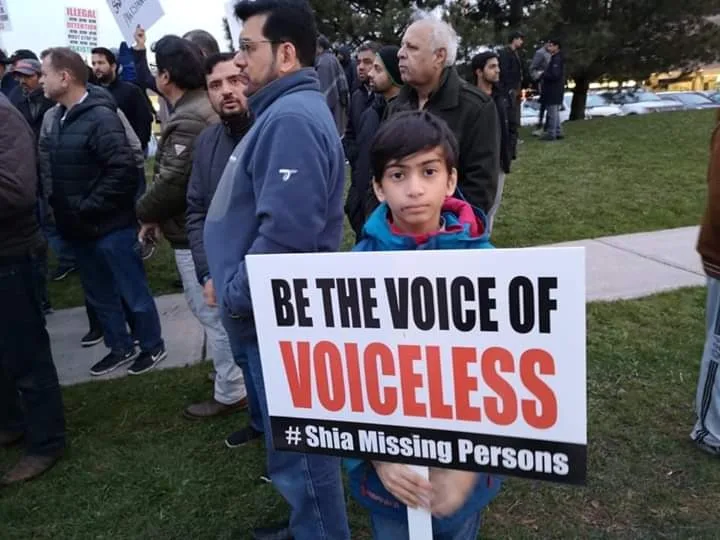After witnessing bombings, massacres and even blasphemy charges, the Shias of Pakistan are now battling Pakistan’s latest epidemic of “enforced disappearances”. In Sunni dominated Pakistan, even Muslims sects are looked upon as kafirs or infidels—and this includes the Shias.
Earlier this week, the Islamabad High Court (IHC) swung the spotlight on “enforced disappearances”, a highly-sensitive issue in Pakistan. Enforced disappearances is a euphemism for State-sponsored kidnappings where in Pakistani military and intelligence ‘pick up’ youth from ethnic minorities in regions like Balochistan, Khyber Pakhtunkhwa and Sindh. They are not produced before the court and hardly any of them comes back dead or alive.
Now this list of ethnic minorities is becoming longer.
In April the Joint Action Committee (JAC) for Shia Missing Persons and families of people kidnapped by the State warned of a countrywide protest if the “enforced disappearances” persons were not returned by the authorities.
At a press conference on April 24, a number of Shia leaders expressed concern over the non-recovery of Shia missing persons. Levelling serious allegations against the government, Allama Iqbal Rizvi of the JAC said: “This is not limited to the forced disappearance or their recovery only there are reports that some of them have been killed”.
Today in Karachi, families of Shia missing persons stopped the procession of Youm e Ali for a while and protested against enforced disappearances. At least 30 Shias are said to be missing. Shia clerics say they have footage showing Rangers personnel taking them into custody.
The South Asia Terrorism Portal (SATP) says that around 2,693 Shias have been killed till June 2018, while 4,847 were injured in targeted attacks and bomb blasts. Estimates about the disappeared Shia youth range between 140 to 300.
The community finds itself vulnerable to the hatred of Sunni radicals as well as suspicions of their own government.
Pakistan is petrified that many Shia youth are travelling to Syria and Iraq to fight with pro-Shia groups in the Middle East. Then there are others who go on pilgrimages to Shia shrines outside Pakistan. Security forces believe that Shia youth from Karachi, Parachinar and Gilgit Baltistan are fighting for Iran-backed mercenary groups in support of Syrian President Bashar Assad.
They also fear that many have been recruited by the Zainabiyoun Brigade—a secretive militia group created by Iran. To keep itself out of trouble, Iran has recruited Shias from other countries like Afghanistan and Pakistan, provided them money and training before pushing them off to Syria.
After the Pakistani intelligence crackdown on Shia youth through the ‘enforced disappearances’ route, Shia groups have begun to protest. For the families of the people who have been kidnapped by the forces, it is an endless search in police stations, hospitals and even mortuaries.
The community feels that it is being targeted by radical Sunnis also. Now terms like “Shia Genocide” are being levelled against Pakistan.
Year 2020 saw massive anti-Shia demonstrations across Pakistan. The protests continued for two days and sent shockwaves not just across Pakistan but also across the world as tens of thousands of Sunni protestors flooded the roads in five cities including capital Islamabad. The protests carried on for two days during which dozens of blasphemy cases were registered against the community.
The Shias have also been targeted by the Sipah-e-Sahaba Pakistan (SSP), earlier called Anjuman Sipah-e-Sahaba (ASS), a Sunni group in Punjab. It has been at the forefront of bombings and killings of the Shia community.
Faced with a spate of enforced disappearances, the Shias are coming together in solidarity. They sat on a month-long protest in front of Pakistan President Arif Alvi’s residence in Karachi in April 2019 demanding the release of their disappeared members. The families of missing persons are demanding that the victims of enforced disappearances be produced in courts otherwise they should be released immediately.
They also protested in front of the Karachi Press Club in December 2021 where the families of Shia missing persons even said that the Shias are a patriotic community of Pakistan and follow the rule of law.
Many of these protests are being led by Rashid Rizvi, head of the Shia Missing Persons Committee in Karachi. Rizvi has not only been leading the protests but also filing cases in courts on behalf of the families of Shia youth who have disappeared. In 2020 Rizvi was arrested under the anti-terrorism act for mounting pressure on Pakistan to release the missing persons.
Pakistan has steadily increased the ambit of enforced disappearances to include more communities. In Balochistan, often the missing persons are found tortured and dead in the province’s deserts and mountain areas.
Commenting on the dangerous issue of enforced disappearances, an editorial in the Daily Times said: “Last month’s protest by crestfallen Shia families as they stood under the blazing sun in their pursuit of the whereabouts of their dear ones (some gone invisible a decade ago) could have been easily dismissed amid the heated hullabaloo over who got to press the big red button of power”. The editorial is trying to say that even the judiciary and Prime Minister Shehbaz Sharif are powerless when it comes to addressing the epidemic of missing persons.

